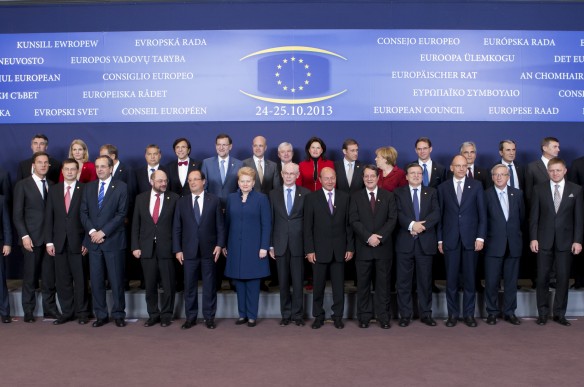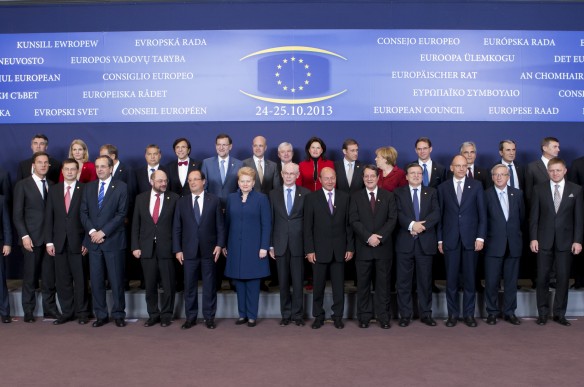
When the Heads of EU Member States met on the 24th and 25th of October in Brussels at the European Council what they had on the table was for the first time ever the Digital Economy. Our sector, the Digital Sector, was the center of the high level talks. This is encouraging for a Digital Telco like us whose main objective is putting the best of (digital) technologies readily in the hand of the wider publics, public and private: consumers, businesses and administrations.
Whether you believe the specific decisions taken were or not ambitious enough (we do believe they are a good step in the right direction, but let us come to this later) the encouraging fact is that when leaders talk about re-launching the recovery of European Economy they put the emphasis on the competitiveness of European Digital sector, on Innovation and on Services. And that means on us as an industry. This is in simple words the right starting point since both the trends in the sector and the role of Europe in the digital ecosystem has not been as brilliant as it should have been in the last decade.
Next to European competitiveness another central but simple idea: the Single Market. As it was rightly put by Herman Van Rompuy, President of the European Council, in his invitation letter to Heads of State and Government:
“A truly single digital market would make a considerable contribution to growth and job creation in our countries, and will be vital for Europe to regain a global lead in these sectors. It will require our strong commitment in three main areas: promoting new investments, developing a consumer and business-friendly Digital Single Market and improving skills. We will also look at ways to further encourage innovation and take full advantage of Europe´s scientific capital”.
Council deliberations and conclusions confirmed the wish of political leaders to endorse a political framework for the years to come with the emphasis placed on investment and digital services. This is again a step in the right direction.
First of all, because the Council has sent a strong signal that Europe needs investments and the right regulatory framework to accelerate the roll-out of new digital infrastructures and the deployment of new technologies, either wired or wireless such as 4G.
Secondly, because Europe has realized that in this world the size and dimension matters. National fragmentation, including regulatory fragmentation, hurts a service industry that should not know geographic borderlines. This is a key turning point and an essential ingredient for the competitiveness of an industry that wants to compete at the global scale.
We should be pleased to see the EU will be supporting the Single Market dimension for Digital Services and its completion by 2015 as a means to underpin the deployment of new services and technologies. Indeed, as Digital Services truly operate in the global market, this renewed focus on the EU single market should be accompanied by decisive steps to equalize as much as possible the conditions operating across the globe thus leveling the competitive playing field between players based in different geographies as well as ensuring the same protections to EU consumers irrespective of the nationality of digital service providers.
And as the Council rightly points out, Big Data and Cloud Computing are important enablers for productivity and new services and should be the primary candidates to benefit from this approach renewed single market focus hopefully in a timely manner.
As anticipated in a previous post, the Council also addressed the “Connected Continent” package recently proposed by the Commission comprising measures as relevant to investment and innovation as the coordination of spectrum policy across the EU, the clarification of net neutrality rules or the rules governing access to the new networks. The Council concluded the need to carry out an intensive examination of the measures contained therein.
We strongly support the approach taken by the Council. The objective should be modernizing digital infrastructures in the EU which are the essential ingredient to underpin a thriving digital services environment. Telecoms regulations should change in this context to help overcoming current EU lags in terms of competitiveness.
We expect now that Member States, as well as the European Parliament, recognize the important advances made in the EU in terms of competition – which should allow for quick advances in terms of deregulation – and address this important legislative work with a view on the wider value chain. Ensuring a level playing field across all elements of the value chain and providing more flexibility for the telecoms markets to restructure are some key elements that should be taken on board in this exercise.
Of particular importance is the explicit reference of the Council conclusions to address the bottlenecks in one’s digital life which persist due to lack of interoperability or lack of portability of content and data. We welcome the political support given by the Council to ensure that consumers and enterprises get not locked-in as they want to switch platforms or devices. As said before, ensuring the same level of consumer protection across the value chain is essential for the development of this industry.
And thirdly, because we perceive both sense of urgency and of purpose in the decisions directions given at this Council to the Commission. As an industry we should also be pleased with the Council push to accelerate legislative proposals pending for some time now. We refer to matters related to reducing costs of new networks roll-out, or measures on the key enablers for digital services such as data protection, e-identification, security and payment services, to name but a few; as much as with the request made to the Commission to accelerate the modernization of Europe’s copyright regime.
Together all these elements should make the basis to creating the right policy environment for backing digital growth, one that fosters investment, innovation and consumer confidence.
But the Council did not stop here. The ambition got further in promoting also usage which should directly translate into consumer’s benefits as well as enhancements in competitiveness, growth and jobs. The modernization of public administrations by the swift implementation of e-government, e-health, e-invoicing and e-procurement, or the push to Open Data or the re-use of public sector information to create more and better digital services for citizens and enterprises across Europe – in addition to reducing the cost of public sector – are key examples of the subjects on which the Council has put its focus. Not less important is the focus on the improvement of digital skills to which the Council has given strong impulse.
To sum up, in recognition of the connection between the competitiveness of the European digital services industry and the competitiveness of the European economy, growth and job the Council has this time given strong signals on the need to move the needle in Europe and change how things are going on. The alternative was accepting that Europe would become a geographic area where citizens and business consume the services and technologies mainly or mostly created elsewhere.
We expect that taken together all the measures and orientations on will help to make a U-turn in the negative trends in Digital Services industry in Europe. European sector should now be ready to retake leadership at the same time that it become a key cornerstone to the re-launch of the competitiveness of the European economy. It is now time for all relevant players and policy makers to work hard to accelerate these desired results.
The next six months are going to be critical with the tight agenda set by this Council. We have high hopes that all this political support materialise in practical achievements on the competitiveness of European Digital services industry, on the perception and investment climate in Digital infrastructures in Europe and the actual improvement of consumer’s confidence – including privacy and security protection – as well as their ability to exercise choice by making effective progress in the portability of their digital lives.










